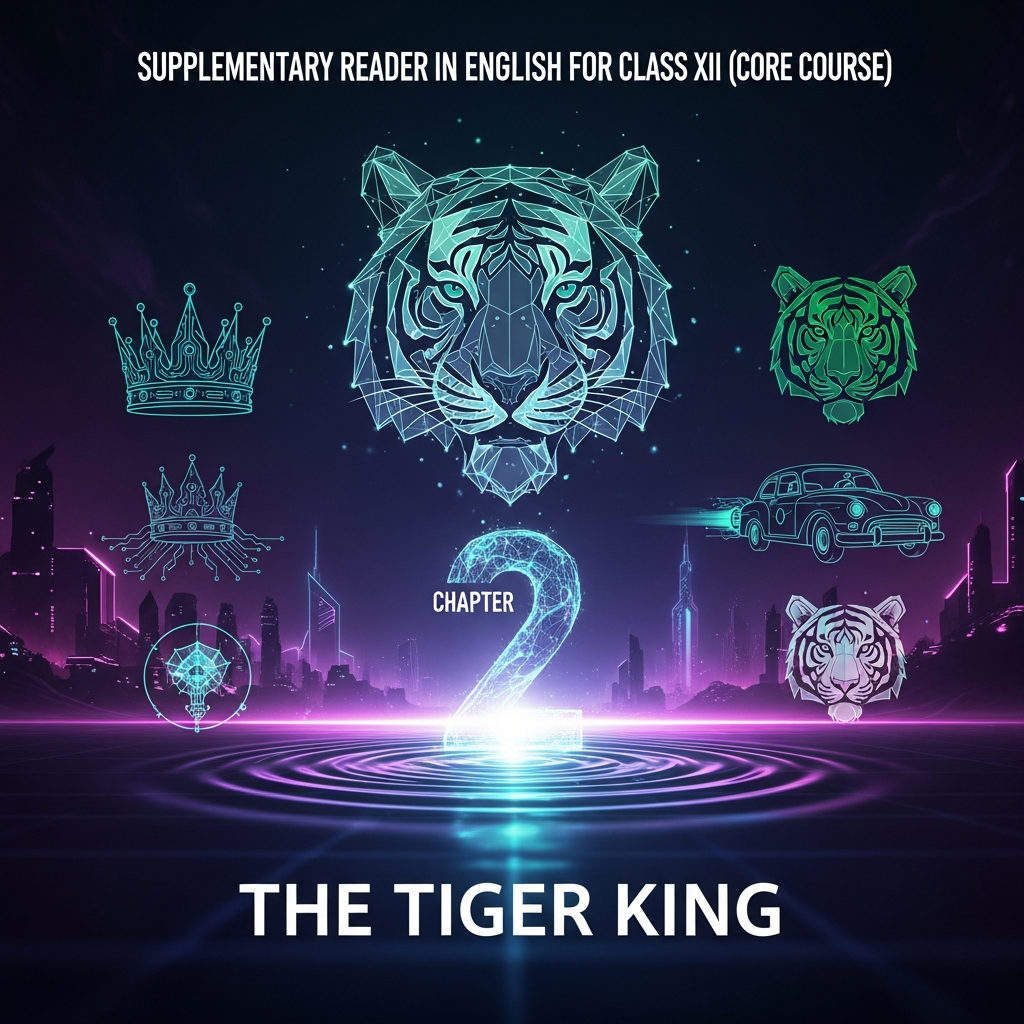Complete Summary and Solutions for The Tiger King – NCERT Class XII VISTAS Supplementary Reader, Chapter 2 – Story Summary, Explanation, Questions, Answers
A detailed summary and critical explanation of Chapter 2 'The Tiger King' by Kalki from the NCERT Class XII VISTAS Supplementary Reader. The story revolves around the Maharaja of Pratibandapuram and his complex relationship with tiger hunting, showcasing themes of power, fate, and human arrogance—along with all NCERT questions, answers, and exercises.
Updated: 2 months ago

The Tiger King
Kalki | Vistas Prose - Ultimate Study Guide 2025
Introduction to the Story
"The Tiger King" is a satirical short story by Kalki Krishnamurthy that mocks the arrogance and folly of those in power through the absurd tale of a Maharaja obsessed with defying fate. Born under a prophecy that he would die by a tiger, the infant prince vows to kill 100 tigers to avert his doom. As the 'Tiger King,' he bans hunting, marries into tiger-rich kingdoms, and exhausts his state's wildlife in a relentless quest. The irony peaks when the 100th tiger—smuggled in and shot at close range—survives the initial bullet, only to be felled by a hunter. Years later, the King dies from an infection caused by a wooden tiger toy sliver, fulfilling the prophecy in a comically twisted manner. Through hyperbolic events and dramatic irony, Kalki critiques autocratic whims, colonial influences, and humanity's hubris over nature.
Key Elements
- Setting: Fictional Pratibandapuram kingdom, blending pre-independence Indian royalty with British colonial elements.
- Narrator: Omniscient third-person, heightening satirical distance.
- Theme Preview: Power's conceit; fate vs. free will; exploitation of wildlife.
Context in Vistas
This story exemplifies satire in the prose section, emphasizing irony and social commentary for CBSE Class 12 exams in 2025.
Points to Ponder
- How does the prophecy drive the plot's absurdity?
- Does the King's death undermine or affirm fatalism?
Reprint 2025-26
About the Author: Kalki Krishnamurthy (1899–1954)
Biography
Kalki Ramaswamy Aiyer Krishnamurthy, pen name Kalki, was a prolific Tamil writer, journalist, and independence activist. Born in Pottipattu, Tamil Nadu, he edited Ananda Vikatan magazine and founded Kalki magazine. Known for historical novels like Ponniyin Selvan, his short stories blend humor, satire, and social critique. "The Tiger King," published in 1943, exemplifies his wit against colonial and feudal absurdities.
Legacy
Kalki's works revitalized Tamil literature, inspiring films and plays. His satire on power remains relevant, influencing modern Indian writing on politics and society.
Worldview
Kalki's narratives, rooted in Gandhian ideals, lampoon authority's excesses while advocating empathy and reform—timely for 2025's discussions on governance and environment.
Expanded Bio
Imprisoned during the freedom struggle, Kalki infused his fiction with anti-colonial fervor, using humor to expose hypocrisies without overt preachiness.
Reprint 2025-26
Before You Read
What is the general attitude of human beings towards wild animals?
This question probes humanity's often exploitative or fearful stance toward wildlife, setting the stage for the story's critique of hunting as dominance rather than harmony.
Pre-Reading Thoughts
- How do superstitions influence rulers' decisions?
- Kalki invites reflection on power's irrational pursuits amid colonial legacies.
Reprint 2025-26
Full Text & Summary
Summary (English)
The Tiger King is a satirical masterpiece by Kalki, unfolding in the fictional kingdom of Pratibandapuram. The story centers on the Maharaja, born as Jilani Jung Jung Bahadur, whose astrologers predict a heroic life ended by a tiger. Defying fate, the infant utters, "Let tigers beware!" and grows into the eponymous Tiger King, vowing to kill 100 tigers. Raised in colonial splendor—English nanny, tutor, films—he assumes rule at 20, haunted by the prophecy. He launches ruthless hunts, slaying his first tiger and taunting the astrologer, who warns of the hundredth's peril. Banning all but his own hunts, he faces dangers bare-handed, emerging victorious. A British officer's tiger hunt request nearly costs his throne; he averts disaster by gifting diamond rings worth three lakhs to the officer's wife. In ten years, he bags 70 tigers, exhausting Pratibandapuram's forests—tigers perhaps fleeing or self-extincting. To continue, he marries a princess from a tiger-abundant state, slaying five or six per visit, amassing 99 skins for his palace. Anxiety peaks for the final quarry; even his father-in-law's woods run dry. When sheep vanish in a village, he proclaims tax exemptions and hunts relentlessly, firing dewan and doubling taxes in fury. The dewan smuggles a Madras zoo tiger, which faints from a near-miss bullet; hunters finish it secretly to spare the King's wrath. Elated, the Maharaja processes the "kill" grandly. On his son's third birthday, seeking a gift, he buys a cheap wooden tiger for 300 rupees, feigning value. Playing, a sliver pierces his hand, festering into septicemia. Three surgeons operate, declaring success—yet he dies. Thus, the "hundredth tiger" exacts ironic revenge. Kalki's narrative employs dramatic irony: readers know the prophecy's twist while the King remains oblivious. It skewers autocratic vanity, colonial sycophancy (diamond bribes), and wildlife decimation for ego. The minions' fear-driven obedience mirrors realpolitik, where loyalty masks self-preservation. Through hyperbolic events—like the zoo tiger's "satyagraha"—Kalki blends humor with tragedy, urging ecological empathy. The King's death, not by fang but wood, underscores fate's subtlety, critiquing humanity's willful blindness to nature's balance. In 2025's context, it resonates with conservation debates, reminding that power's conceits endanger both rulers and realms. The story's wit lies in its layered irony: the astrologer's hyperbolic vow to become an insurance agent pales against the King's fatal folly. Ultimately, "The Tiger King" affirms satire's bite—exposing how the mighty fall not to beasts, but to their own absurd pursuits, leaving a legacy of empty thrones and depleted jungles.
सारांश (हिंदी)
कalki का 'द टाइगर किंग' एक व्यंग्यात्मक कृति है, जो प्रतिबंधापुरम राज्य में घटित होती है। कहानी महाराजा जिलेनी जंग जंग बहादुर पर केंद्रित है, जिनके ज्योतिषियों ने भविष्यवाणी की कि वह वीर बनेगा लेकिन बाघ से मरेगा। भाग्य को चुनौती देते हुए शिशु कहता है, "बाघों सावधान!" और 'टाइगर किंग' बनकर 100 बाघ मारने की प्रतिज्ञा करता है। अंग्रेजी नर्स, ट्यूटर, फिल्मों में पलकर 20 में राज संभालते हुए वह भविष्यवाणी से ग्रस्त रहता है। वह क्रूर शिकार शुरू करता है, पहला बाघ मारकर ज्योतिषी को ललकारता है, जो सौवें की चेतावनी देता है। केवल अपना शिकार प्रतिबंधित कर, वह नंगे हाथों खतरों से जूझता, विजयी होता। ब्रिटिश अधिकारी की शिकार मांग से सिंहासन संकट में पड़ता; वह अधिकारी की पत्नी को तीन लाख के हीरे भेंटकर बचाता है। दस वर्षों में 70 बाघ मारते हुए प्रतिबंधापुरम के जंगल खाली हो जाते—बाघ शायद भागे या आत्महत्या कर ली। जारी रखने को वह बाघ-प्रधान राज्य की राजकुमारी से विवाह करता, ससुराल में पांच-छह मारकर 99 चमड़े जमा करता। अंतिम बाघ की चिंता चरम पर; ससुर के जंगल भी सूख जाते। गांव में भेड़ें गायब होने पर कर-मुक्ति घोषित कर शिकार पर निकलता, दीवान को निकालता, कर दोगुना करता। दीवान मद्रास चिड़ियाघर से बाघ लाता, जो गोली से बेहोश; शिकारी नजदीक मार गिराते। आनंदित महाराजा जुलूस निकालता। पुत्र के तीसरे जन्मदिन पर सस्ता लकड़ी का बाघ 300 रुपये में खरीदता, मूल्य बताकर। खेलते कांटा हाथ चुभता, संक्रमण फैलता। तीन शल्यचिकितक ऑपरेट करते, सफल घोषित—फिर भी मर जाता। इस प्रकार 'सौवां बाघ' विडंबनापूर्ण प्रतिशोध लेता। कालकी की कथा नाटकीय विडंबना से भरी: पाठक भविष्य जानते, राजा अज्ञानी। वह निरंकुश अभिमान, औपनिवेशिक चापलूसी (हीरे की रिश्वत), वन्यजीव विनाश को चोट करती। सेवकों का भय-प्रेरित आज्ञापालन वास्तविक राजनीति दर्शाता। अतिशयोक्तिपूर्ण घटनाओं—जैसे चिड़ियाघर बाघ का 'सत्याग्रह'—से कालकी हास्य-ट्रेजडी मिश्रित करता, पारिस्थितिक संवेदना जगाता। राजा की मृत्यु, दांत न कि लकड़ी से, भाग्य की सूक्ष्मता बताती, प्रकृति संतुलन की अंधता की आलोचना। 2025 के संदर्भ में संरक्षण बहसों से गूंजती, सत्ता के अभिमान से राजा-राज्य दोनों खतरे में। कथा का चतुराई परतों वाली विडंबना में: ज्योतिषी का बीमा एजेंट बनने का अतिशयोक्ति राजा की घातक मूर्खता के आगे फीका। अंततः 'द टाइगर किंग' व्यंग्य की काट पुष्ट करता—महान कैसे पशुओं से न कि अपनी बेतुकी महत्वाकांक्षाओं से गिरते, खाली सिंहासन और क्षीण जंगलों की विरासत छोड़ते।
Full Text
Key Imagery
- Tiger skins on palace walls: Symbolize ego's trophies.
- Wooden tiger: Ironic harbinger of doom.
- Astrologer's tuft: Represents shattered certainties.
Reprint 2025-26
Glossary
- Sata Vyaghra Samhari: Slayer of a hundred tigers, the King's title underscoring his obsession.
- Durai: British officer, highlighting colonial dynamics.
- Satyagraha: Non-violent resistance, humorously applied to the tiger's refusal.
Additional Terms
- Dewan: Prime minister or chief advisor in princely states.
- Harakiri: Ritual suicide, whimsically suggesting tigers' despair.
- Duraisani: Wife of the British officer, recipient of bribes.
Reprint 2025-26
Understanding the Story
Plot Overview
From prophetic birth to ironic death, the narrative arcs through hunts, marriage, and a faked kill, culminating in a toy's fatal prick.
Characters
- Maharaja (Tiger King): Arrogant ruler, defying fate through excess.
- Dewan: Cunning aide, smuggling the tiger to appease.
- Astrologer: Prophetic voice, whose warning proves prescient.
Narrative Style
Third-person satire amplifies absurdity, using foreshadowing and exaggeration for comedic critique.
Setting Details
Pratibandapuram's forests and palace evoke feudal India's clash with British whims, amplifying power's isolation.
Reprint 2025-26
Themes & Critical Analysis
Central Themes
- Satire on Power: Exposes rulers' conceits through the King's tiger mania.
- Dramatic Irony: Audience knows the prophecy's twist, heightening humor.
- Human vs. Nature: Critiques wildlife exploitation for personal glory.
Sub-Themes
- Fate vs. Will: The King's defiance ironically fulfills doom.
- Colonial Influence: Bribes and hunts reflect subservience.
Critical Appreciation
Kalki's irony dismantles authority, using comedy to advocate humility and ecological care in a post-colonial lens.
Deeper Analysis
Symbolism: Tigers embody untamable fate; wooden toy subverts savagery.
Cultural Context: 1940s India, satirizing princely states' absurdities.
- Relevance: Parallels modern elite's environmental disregard.
Discussion Prompts
- Is the King's quest heroic or tyrannical?
- How does satire humanize flaws in leaders?
Reading with Insight
1. The story is a satire on the conceit of those in power. How does the author employ the literary device of dramatic irony in the story?
Dramatic irony arises as readers know the prophecy's ironic fulfillment via the wooden tiger, while the oblivious King celebrates his "victory," amplifying the satire on his hubris.
2. What is the author’s indirect comment on subjecting innocent animals to the willfulness of human beings?
Kalki condemns human dominance over wildlife, portraying tigers' extinction and the smuggled zoo beast as tragic absurdities born of ego, urging respect for nature's innocence.
3. How would you describe the behaviour of the Maharaja’s minions towards him? Do you find them truly sincere towards him or are they driven by fear when they obey him? Do we find a similarity in today’s political order?
Minions like the dewan act obsequiously out of fear—smuggling tigers to avoid wrath—lacking sincerity. This mirrors contemporary politics, where aides prioritize survival over loyalty.
4. Can you relate instances of game-hunting among the rich and the powerful in the present times that illustrate the callousness of human beings towards wildlife?
Modern examples include trophy hunting by elites in Africa or India's poaching scandals, echoing the King's callousness by prioritizing thrill over conservation.
5. We need a new system for the age of ecology — a system which is embedded in the care of all people and also in the care of the Earth and all life upon it. Discuss.
The story advocates sustainable governance integrating human welfare with biodiversity—contrasting the King's exploitation—aligning with global calls for eco-centric policies like India's wildlife acts.
Reprint 2025-26
Interactive Quiz - Test Your Understanding
10 MCQs on the story, themes, and analysis. Aim for 80%+!
Suggested Reading
Kalki's Works
- Ponniyin Selvan – Epic historical novel on Chola dynasty.
- Parthiban Kanavu – Tale of ambition and legacy.
More
- Related: R.K. Narayan's satirical stories; environmental essays on wildlife ethics.
- Essays: On satire in Indian literature.
Reprint 2025-26

Group Discussions
No forum posts available.
Easily Share with Your Tribe


